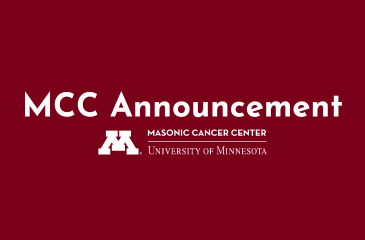Masonic Cancer Center announces transition for several population science leaders
We recently shared the news that the National Cancer Institute (NCI) has renewed our status as an “outstanding” comprehensive cancer center, ushering in a total of $20.4 million in federal funding to drive our work for the next five years. As we embrace the continued journey of progress and innovation at the Masonic Cancer Center (MCC), University of Minnesota, we are also pleased to announce some exciting leadership changes within our Executive Committee. These transitions not only signal a new chapter in our center’s storied history but also reinforce our unwavering commitment to pioneering cancer research, education, and patient care.
Cancer Prevention and Control:
Dorothy Hatsukami, PhD, a pioneer in the field of nicotine addiction and cancer prevention, is stepping down from her role as Associate Director, Cancer Prevention and Control. In this role, she had oversight of our two population science programs, Screening, Prevention, Epidemiology, and Cancer Survivorship (SPECS) and Carcinogenesis and Chemoprevention. Her leadership in this role strengthened these research programs as shown by several successful NCI designation renewals. Her own research contributions to reducing tobacco-related cancers have left an indelible mark on our center, on Minnesota, and on the nation, resulting in national impact through policies set forth by the U.S. Food and Drug Administration (FDA) related to nicotine levels and menthol in cigarettes and other tobacco products.
Heather Nelson, MPH, PhD will be taking on the mantle of leadership for Cancer Prevention and Control at MCC. As a former co-program leader of the SPECS program, she is an integral part of this team. Nelson’s expertise in cancer epidemiology and public health uniquely positions her to lead these efforts. Her dedication and insights have been invaluable, especially in her role as co-principal investigator (PI) for the multi-disciplinary 10,000 Families Study, investigating environmental exposures and cancer risk across Minnesota. Her multidisciplinary approach will enrich our cancer prevention strategies and lend a significant contribution to reducing the burden of cancer on Minnesotans and beyond.
Carcinogenesis and Chemoprevention Program:
Lisa Peterson, PhD, has co-led the Carcinogenesis and Chemoprevention through several successful NCI designation renewals and will be passing the torch of leadership as she steps down from her current role. She will continue her exceptional research program in environmental carcinogenesis including as a co-PI of the 10,000 Families Study and as PI of the Minnesota HHEAR Targeted Analysis Laboratory. Her contributions have been instrumental in advancing our understanding of how tobacco and other environmental carcinogens cause cancer.
Stepping into this role as co-leader is Silvia Balbo, PhD, an associate professor in the University of Minnesota School of Public Health (SPH). Balbo is known for her innovative research on the interaction between DNA and chemicals to investigate how lifestyle and environmental exposures cause disease. Balbo will spearhead the program together with current co-leader Frank Ondrey, MD, PhD.
Screening, Prevention, Etiology, and Cancer Survivorship (SPECS) Program:
Heather Nelson, PhD, MPH, whose leadership in cancer epidemiology has greatly contributed to our understanding of cancer risk factors and disparities has assumed the role of Associate Director, Cancer Prevention and Control as noted above.
We are excited to announce that Helen Parsons, PhD, MPH, an associate professor in the UMN School of Public Health and an expert in health outcomes research, will be stepping into the role vacated by Nelson. As the new co-leader for the SPECS Program alongside co-leader Anne Blaes, MD, MS, Parsons will bring a wealth of experience and a profound commitment to improving cancer care and outcomes by enhancing community health initiatives, further strengthening our center’s impact on our community of Minnesotans.
As we navigate these transitions, we are filled with gratitude for the innumerable contributions made by Drs. Hatsukami and Peterson over many years. The science of the Masonic Cancer Center has been accelerated because of their commitment and involvement. We are confident that, under the leadership of Drs. Silvia Balbo, Helen Parsons, and Heather Nelson, the Masonic Cancer Center will continue to thrive, innovate, and lead in the fight against cancer. Please join us in celebrating these outstanding individuals and supporting them in their new roles.
